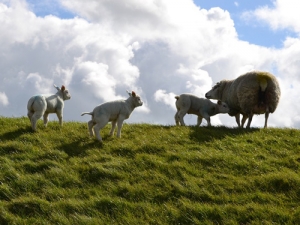Top wool advocate bales out
The conversion of productive farmland into trees has pretty much annihilated the wool industry.
 The National Council of New Zealand Wool Interests has made the maximum allowable weight restricted to 200kg.
The National Council of New Zealand Wool Interests has made the maximum allowable weight restricted to 200kg.
New amendments in the Industry Code of Practice have been made in relation to the maximum allowable weight of bales of greasy wool.
The National Council of New Zealand Wool Interests has made the maximum allowable weight restricted to 200kg.
The council comprises associations and organisations involved in the domestic and international trading of greasy and scoured wool. It acts as the New Zealand member of the International Wool Textile Organisation, which represents the interests of the wool textile trade at the global level.
"The National Council and its members are committed to providing a safe working environment throughout the wool industry," the council says in a statement
"Increasing concerns relating to bales weighing over 200kg (which are estimated to cover approximately 6% of the national clip) have prompted the council to address the issue.
"Bales weighing in excess of 200kg can contribute to workplace accidents and throughout the industry provide a significant problem during dumping and shipping. These bales have been assessed as hazards during transport and handling, with changes deemed necessary to comply with tougher Occupational Health and Safety laws being introduced in New Zealand.
"The New Zealand Wool Brokers Association and the Federation of Private Wool Merchants have been actively promoting the new bale weight limits to growers through their respective newsletters. Woolgrowers are encouraged to comply with the new bale weight limit to minimise any re-packing and additional charges that may be incurred."
The National Wild Goat Hunting Competition has removed 33,418 wild goats over the past three years.
New Zealand needs a new healthcare model to address rising rates of obesity in rural communities, with the current system leaving many patients unable to access effective treatment or long-term support, warn GPs.
Southland farmers are being urged to put safety first, following a spike in tip offs about risky handling of wind-damaged trees
Third-generation Ashburton dairy farmers TJ and Mark Stewart are no strangers to adapting and evolving.
When American retail giant Cosco came to audit Open Country Dairy’s new butter plant at the Waharoa site and give the green light to supply their American stores, they allowed themselves a week for the exercise.
Fonterra chair Peter McBride says the divestment of Mainland Group is their last significant asset sale and signals the end of structural changes.

OPINION: Your old mate welcomes the proposed changes to local government but notes it drew responses that ranged from the reasonable…
OPINION: A press release from the oxygen thieves running the hot air symposium on climate change, known as COP30, grabbed your…